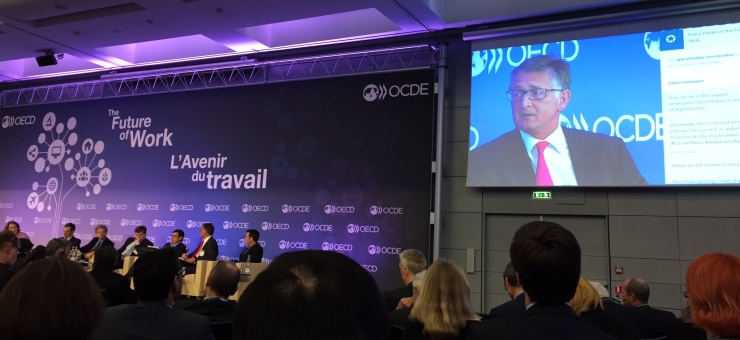News
Jennings challenges Uber model at OECD Future of Work Forum

Treat your drivers as employees and respect existing principles on working rights – these were Philip Jennings’ messages to tech giant Uber at the OECD Future of Work Forum.
Held in Paris to coincide with a Ministerial meeting on Labour and Employment, the Forum brought together over 300 participants including key academics, Labour and Employment Ministers, entrepreneurs and leading representatives from the business sector and trade unions.
“We have to question the values of a world in which a company says ‘no thanks’ to regulation and evades responsibility to its workforce by saying there is no employment relationship in place,” Jennings commented during a panel which included Uber’s Chief Strategist David Plouffe.
The American ride share platform, valued at over $50 billion, has come under fire for its tax arrangements and refusal to adhere to local labour rules and human rights principles. On-demand working arrangements are creeping up the agenda of governments who see beyond the excitement to a business model which gains a competitive advantage by ignoring long-standing rules.
“I don’t think it’s sustainable,” said German Labour Minister Andrea Nahles. “Taxes should be paid if they are making profits in our countries. I want these new business models to play the game and be responsible in our societies. They are not an island that can simply come in and disappear.”
“They are questioning the very definition of a job,” said OECD Secretary General Jose Angel Gurria. “Many of these workers face similar problems to those in non-standard work – long hours, high stress and a lack of support. This raises questions with regards to workers’ rights, taxation, pensions, healthcare and security. These need to be addressed urgently.”
Uber’s David Plouffe defended his company’s attitudes towards employment relations and non-standard work. “If you talk to people who drive on our platform, they want more flexible work,” he said.
“Do I think we are heading to a place we are going to be a nation or a world of freelancers? No. Most people are using this to augment a tough jam or to put themselves in an economic security situation.”
ILO Director General Guy Ryder said the rise of on-demand employment had the potential to alter the way in which we calculate social progress itself.
“The implicit unwritten assumption was symbolised by the accession of the world’s population to a nice standard full-time job with an employer you can negotiate with,” Ryder said. “What is now happening is like the final version of that and social progress might no longer be able to be quantified in terms of high-quality employment.”
Jennings insisted that unions can provide solutions to the challenges raised by the new world of work and lead a “just transition” for workers in a digital-led economy. The General Secretary said UNI is committed to building on the framework put in place at the Cape Town World Congress. Policy platforms emerging include quality jobs, upskilling, social inclusion and stronger labour market institutions.
German Labour Minister Andrea Nahles agreed on the need for better social dialogue in the future workplace.
“I don’t think we should always do this through laws,” Nahles said. “I would like the social partners to get together and solve as much as possible that they can so the workers feel involved and have a sense of security.”
In commenting about an American workforce which has found itself “flexibilised” out of fair labour contracts, U.S. Secretary of Labour Thomas Perez admitted that in the USA “we let things slip.”
The OECD labour and employment ministers have committed to tackling labour market issues thrown up by the digital revolution as they work out a revised OECD jobs strategy.
The debate on what constitutes the future of work is gathering pace. The 2016 World Economic Forum gets underway this week with the future of work as a central theme. A further OECD summit on the subject will take place in Cancun in June whilst it will also be the central theme of the ILO’s centenary conference in 2019.

